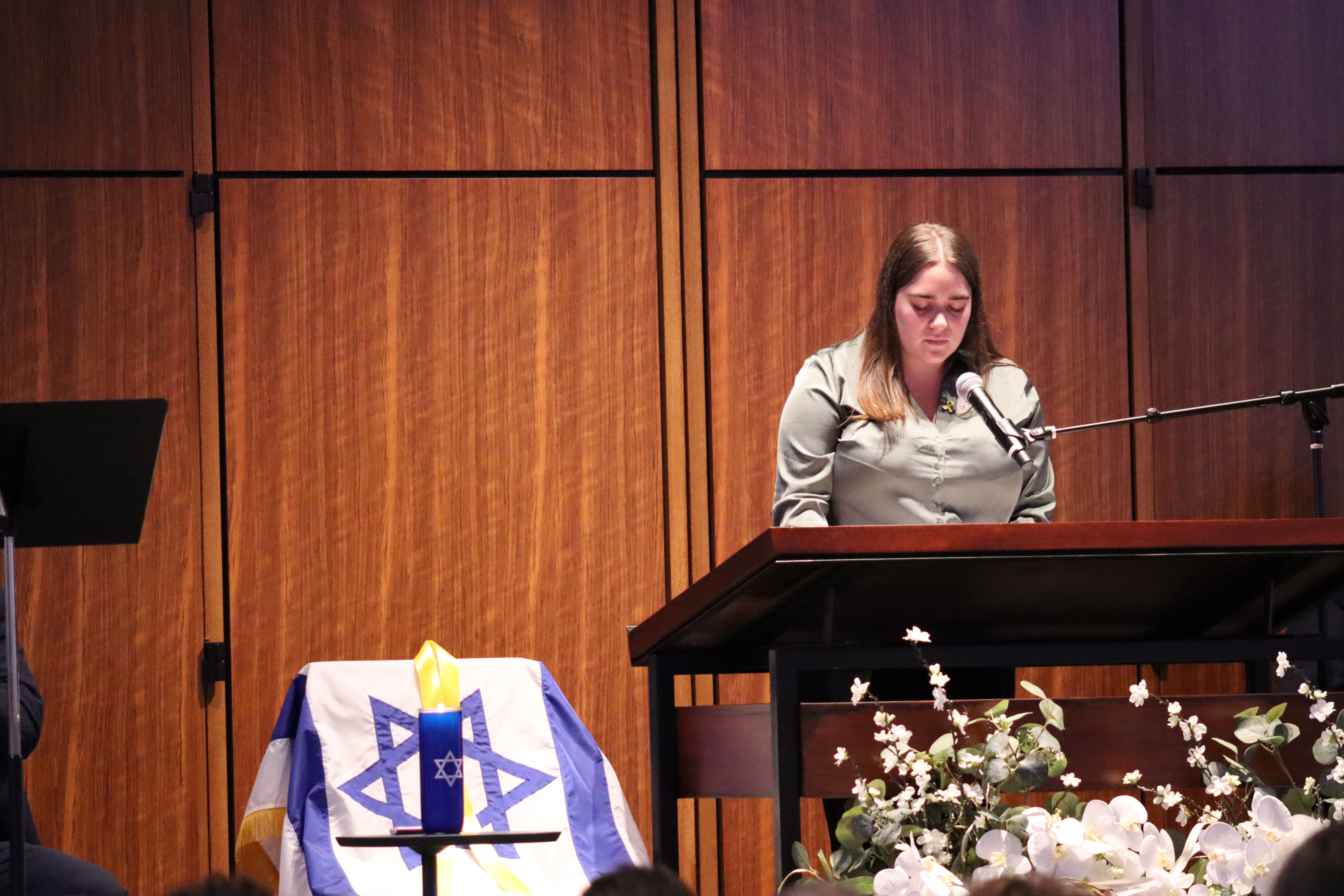Jews across the world marked the first anniversary of the Oct. 7 terror attacks, and Kansas City’s Jewish community organized a commemoration and a temporary art installation for the victims.
These are two of the myriad services, prayers, sermons and artworks that have taken place across the Kansas City area by Jewish organizations and congregations to mark the anniversary.
Commemoration Service
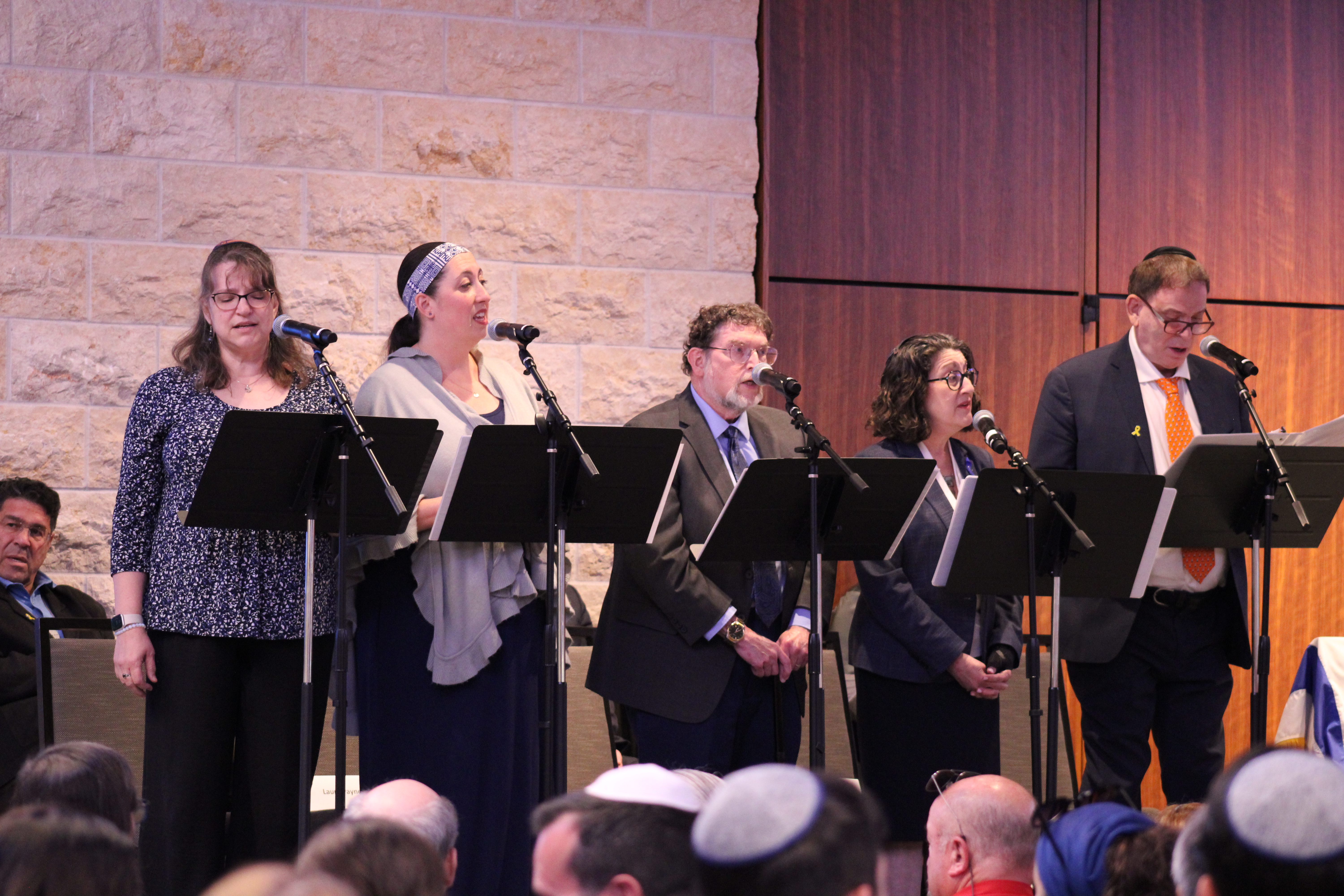
Lezlie Zucker, Laura Payne, Rabbi Larry Karol, Cantor Sharon Kohn and Cantor Aron Hayoun singing “Eli, Eli.”
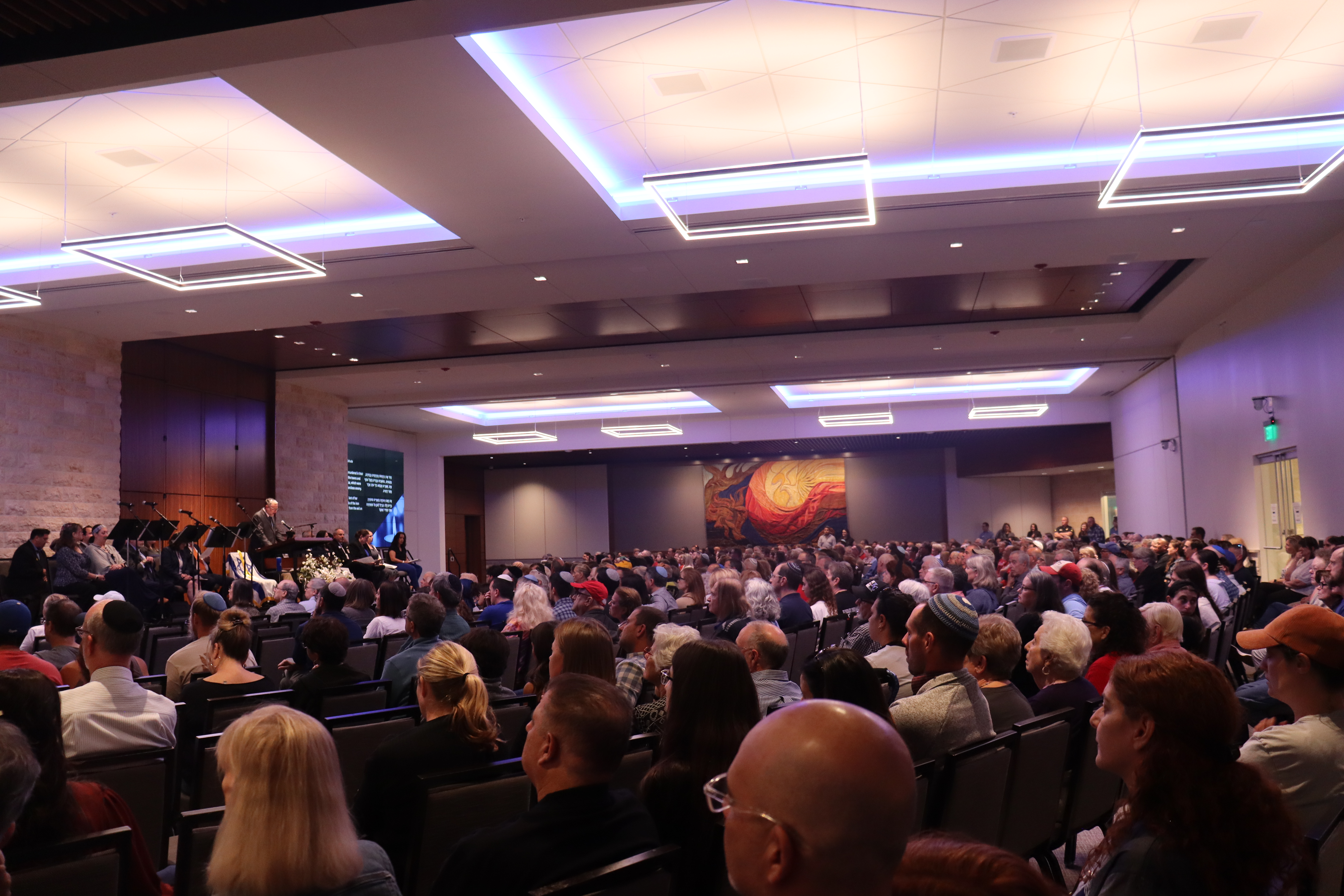
Hundreds of people gathered at B’nai Jehudah for the Oct. 7 commemoration.
The community commemoration service took place on Monday at The Temple, Congregation B’nai Jehudah, where the community’s initial gathering in solidarity took place on Oct. 9, 2023. The event was organized by Jewish Community Relations Bureau | American Jewish Committee (JCRB|AJC), Jewish Experiences (a collaboration of The J and Jewish Federation), Jewish Federation and the Rabbinical Association of Greater Kansas City.
“Unfortunately, the Jewish people have a lot of experience commemorating tragedy, from Tisha B’av to Yom Hashoah to Yom Hazikaron, and we now add Oct. 7 to the list,” Federation President and CEO Jay Lewis said at the gathering. “But, only one year removed from that horrific day, the feelings are intensified because Israel is at war with Hamas in Gaza, under attack from Hezbollah and Iran, over 100 hostages are still in captivity and antisemitism continues to rise throughout the world.”
Rabbis and representatives of nearly every community congregation either spoke, led a prayer or read a poem, including: Rabbi Caitlin Brazner, Rabbi Stephanie Kramer and Rabbi Rachel Rothstein of B’nai Jehudah; Rabbi Mark Glass of Congregation Beth Israel Abraham and Voliner; Rabbi David Glickman and Rabbi Talia Kaplan of Congregation Beth Shalom; Rabbi Moshe Grussgott and Rabbi Herbert J. Mandl of Kehilath Israel Synagogue (K.I.); Rabbi Alan Londy of The New Reform Temple; and Rabbi Sam Stern of Temple Beth Sholom in Topeka, Kansas. Also speaking were Rabbi Elizabeth Bonney-Cohen of Hyman Brand Hebrew Academy (HBHA); Rabbi Larry Karol of Temple Beth-El in Las Cruces, New Mexico; Rabbi Jonathan Rudnick of Jewish Family Services; and Rabbi Linda Steigman.
Psalms, songs and prayers were sung by Cantor Aron Hayoun and Arthur Hayoun of K.I.; Rabbi Karol; Cantor Sharon Kohn; Laura Payne of B’nai Jehudah; and Lezlie Zucker of Congregation Beth Torah.
The Israeli Kansas City community was represented by Moshit Snir, who lit a yizkor candle in memory of the victims, and Mika Kislanski, the Kansas City community shalicha.
“This past year has been one of unimaginable pain and uncertainty. One year ago today, on Oct. 7, our lives changed forever,” Kislanski said. “The brutal attacks that unfolded that day and the war that followed has impacted so many families, including many of you here tonight. Each day since has been marked by heartache as we witness the toll these events have taken on our brothers and sisters in Israel.”
Kislanski also directly addressed the Israeli community in Kansas City, saying “You have faced your own unique challenges this past year, and your pain is palpable. We stand with you in solidarity, recognizing the weight of your experiences. Your stories, your fears and your hopes matter to us. I urge our larger community to embrace you, to listen to your voices and to provide the support you need during this difficult time. You are not alone, and we are here for you.”
The service ended with everybody reciting “Hatikvah,” the Israeli national anthem.
Art Installation
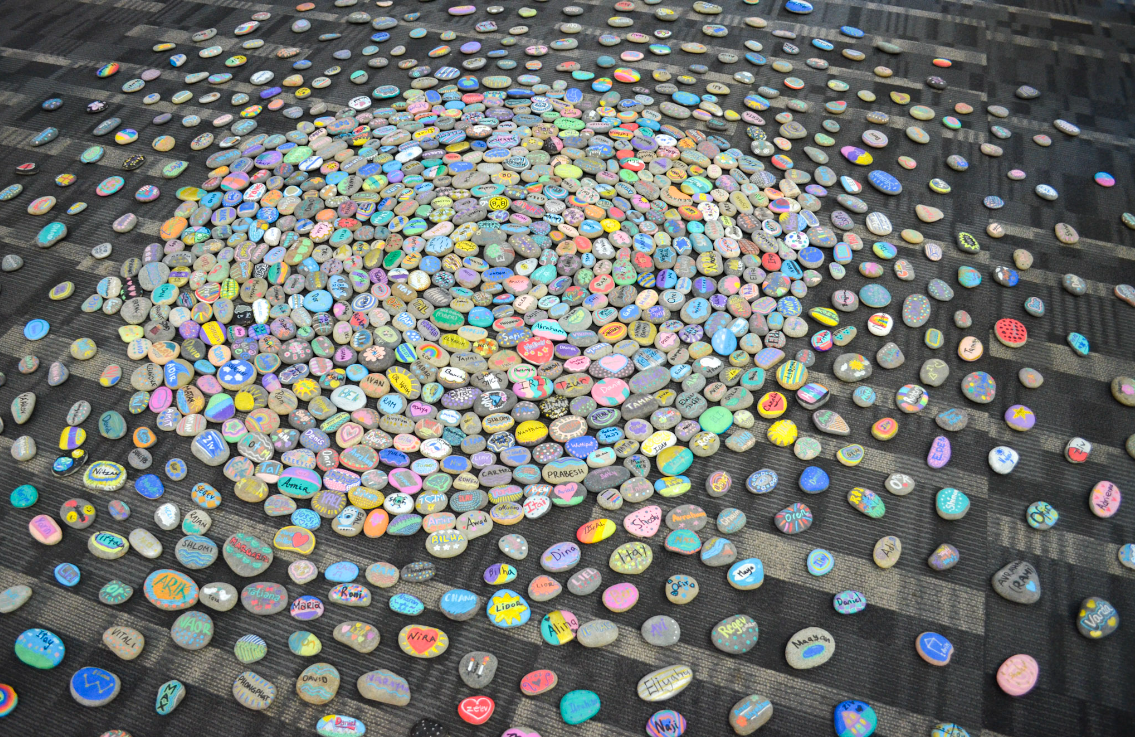
Nearly 1,200 stones with names of victims of the Oct. 7 attacks comprised a recent art installation at the Jewish Community Campus. (Rachel Kaseff)
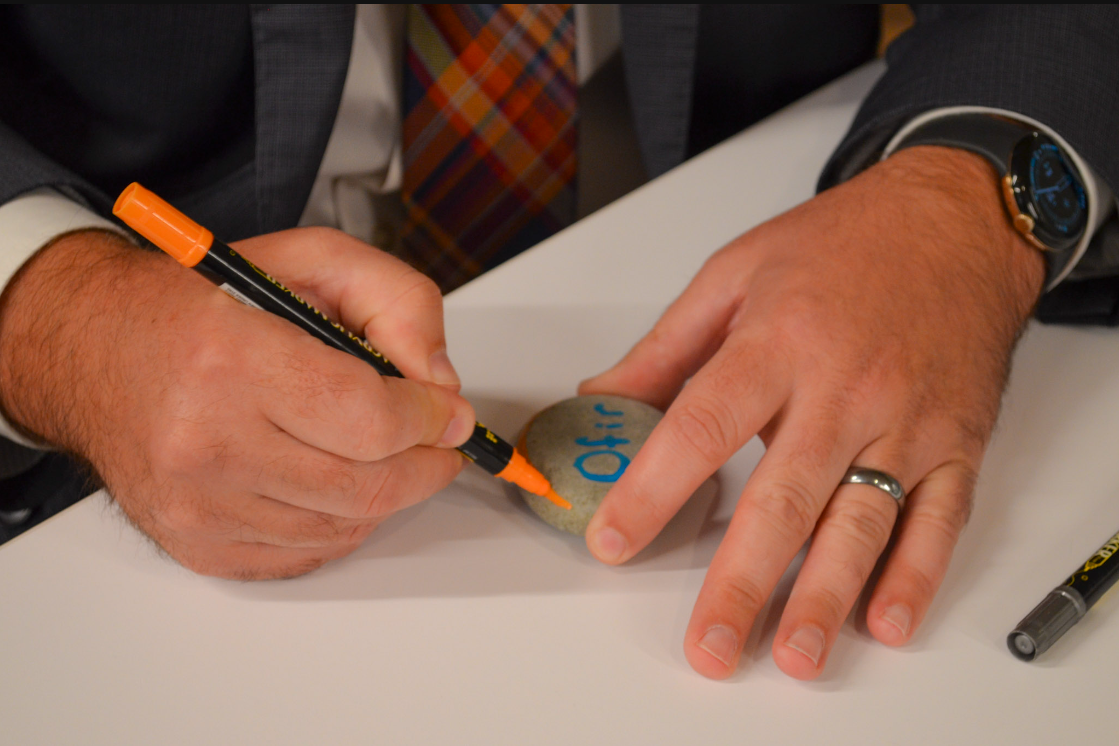
An attendee of the art installation’s debut writes the name of a victim of the Oct. 7 attacks on a stone to be added to the artwork. (Rachel Kaseff)
Throughout the month of October, “A Year Without” — an art installation of nearly 1,200 stones each hand-painted with a name of a victim of the Oct. 7 attacks — will be placed in the lobby of The J. Surrounding the stones were photographs, each depicting a local community member and their story of how they were impacted by the attacks. Visitors were also welcome to add their responses and stories to a display.
Dozens of staff from organizations located at the Jewish Community Campus and Jewish students at HBHA and the University of Kansas helped paint hundreds of the memorial stones. Attendees of the installation’s opening had the opportunity to paint a rock to help complete the artwork.
Organizations involved with the exhibit included JCRB|AJC, Jewish Experiences, the Midwest Center for Holocaust Education (MCHE), The J and HBHA. The artwork’s debut was attended by both Jewish and non-Jewish community leaders, clergy and elected officials.
“Today, our local Jewish community is telling our story in our own words,” said Neta Meltzer, JCRB|AJC interim executive director, at the installation’s debut. “[The exhibit includes] written testimonies of members of our community — people who grew up here, have family and deep connections here, who were directly impacted by the attacks on Oct. 7… I want to thank them for sharing [their] stories. Reflecting on that day, even a year later, remains fraught and painful.”
One of the driving forces behind the stone artwork was Kislanski, who painted hundreds of the stones herself. She came to Kansas City in September of 2023, just one month before the attack in Israel.
“The events of this past year have been profoundly challenging, not only for me, but for the entire Jewish community here and in Israel. Each day I find myself grappling with the weight of these realities,” she said at the artwork’s debut.
As the community shalicha (emissary), Kislanski’s focus is to help people understand that Israel, its people and its government are multifaceted, multicultural, diverse and complex.
“We must remember that criticism of a government does not necessitate the vilification of an entire people,” she said. “In this context, my role as an emissary has become even more vital. I am here to engage in constructive conversations, to promote understanding and to foster solidarity, not just among Jews, but with all those who cherish human dignity and peace.”
Jessica Rockhold, executive director of MCHE, spoke about the effect that Oct. 7 had on Holocaust survivors.
“The human impact of Oct. 7 and the year of incidents which followed is undeniable for survivors,” she continued. “It comes late in their lives. It’s tested their faith in the value of having spent decades sharing their testimonies and their suffering in the hopes of creating a safer world for their families.”
Rockhold shared that despite the antisemitism, MCHE has seen “an unprecedented number of requests for information about antisemitism” and outreach in good faith for credible, educational information.
“What we at MCHE have learned this year is that over 30 years of Holocaust education, predominantly serving the non-Jewish community, has created a public that recognizes a problem and wants to address it,” she said. “...Our survivors taught us to face and embrace the pain, but then to use that experience and to shift our focus outward to creating a better world. We can draw strength from their example, for there is much work ahead for each of us to do.”



